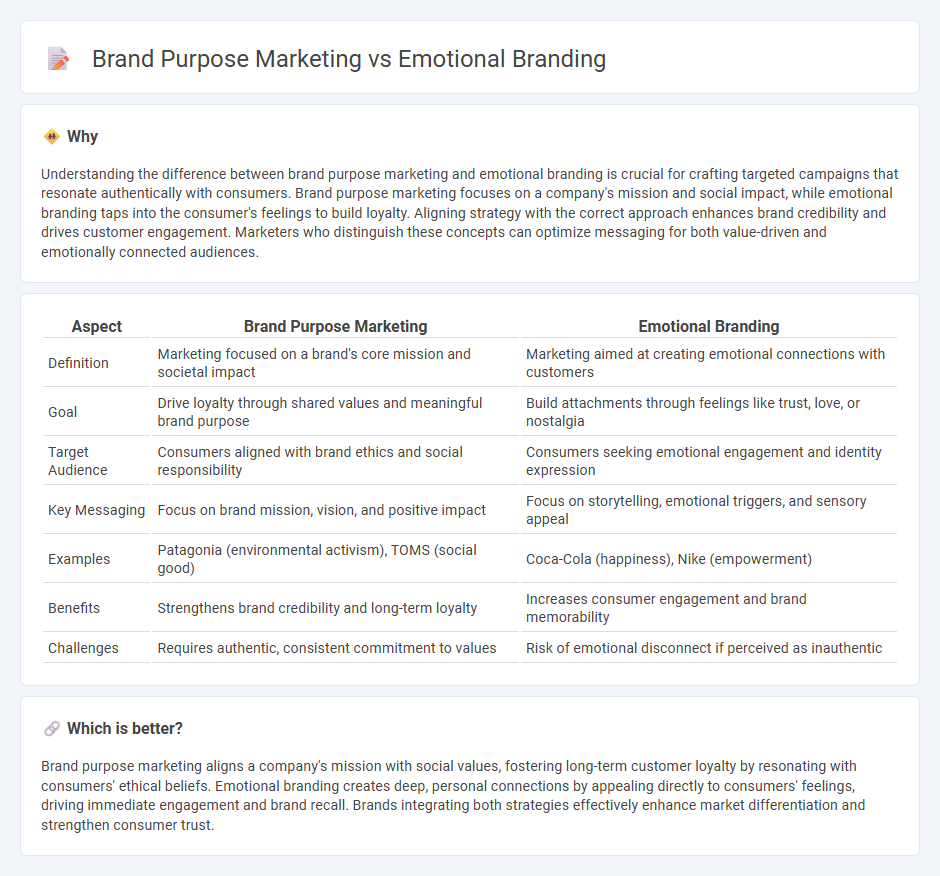
Brand purpose marketing focuses on a company's mission and values to connect with consumers seeking authenticity and meaningful impact, while emotional branding targets feelings and experiences to create deep, lasting attachments with customers. Both strategies aim to build loyalty but approach it through different psychological triggers--purpose-driven narratives appeal to shared beliefs, whereas emotional branding leverages sentimental resonance. Explore how these marketing approaches shape consumer behavior and brand success.
Why it is important
Understanding the difference between brand purpose marketing and emotional branding is crucial for crafting targeted campaigns that resonate authentically with consumers. Brand purpose marketing focuses on a company's mission and social impact, while emotional branding taps into the consumer's feelings to build loyalty. Aligning strategy with the correct approach enhances brand credibility and drives customer engagement. Marketers who distinguish these concepts can optimize messaging for both value-driven and emotionally connected audiences.
Comparison Table
| Aspect | Brand Purpose Marketing | Emotional Branding |
|---|---|---|
| Definition | Marketing focused on a brand's core mission and societal impact | Marketing aimed at creating emotional connections with customers |
| Goal | Drive loyalty through shared values and meaningful brand purpose | Build attachments through feelings like trust, love, or nostalgia |
| Target Audience | Consumers aligned with brand ethics and social responsibility | Consumers seeking emotional engagement and identity expression |
| Key Messaging | Focus on brand mission, vision, and positive impact | Focus on storytelling, emotional triggers, and sensory appeal |
| Examples | Patagonia (environmental activism), TOMS (social good) | Coca-Cola (happiness), Nike (empowerment) |
| Benefits | Strengthens brand credibility and long-term loyalty | Increases consumer engagement and brand memorability |
| Challenges | Requires authentic, consistent commitment to values | Risk of emotional disconnect if perceived as inauthentic |
Which is better?
Brand purpose marketing aligns a company's mission with social values, fostering long-term customer loyalty by resonating with consumers' ethical beliefs. Emotional branding creates deep, personal connections by appealing directly to consumers' feelings, driving immediate engagement and brand recall. Brands integrating both strategies effectively enhance market differentiation and strengthen consumer trust.
Connection
Brand purpose marketing and emotional branding are intrinsically linked as both focus on creating deep, meaningful connections between consumers and brands. Brand purpose marketing defines a company's core mission and social impact, which emotional branding leverages to evoke genuine feelings and loyalty. This synergy enhances customer engagement by aligning values with emotional experiences, driving long-term brand affinity.
Key Terms
Emotional Branding:
Emotional branding creates deep psychological connections between consumers and brands by tapping into feelings such as trust, nostalgia, or happiness, enhancing customer loyalty and engagement. It uses storytelling, sensory experiences, and emotional triggers to build a memorable brand identity that resonates on a personal level. Discover how emotional branding transforms consumer relationships and drives lasting brand success.
Brand Attachment
Emotional branding centers on creating deep, affective connections between consumers and brands to foster Brand Attachment, which enhances customer loyalty and advocacy. Brand purpose marketing emphasizes aligning brand values with social or environmental causes, cultivating trust and meaningful consumer engagement. Explore how leveraging Brand Attachment can amplify your brand strategy by learning more about the interplay between emotional branding and brand purpose marketing.
Storytelling
Emotional branding leverages storytelling to create deep, personal connections by evoking feelings that resonate with consumers' identities and experiences. Brand purpose marketing uses storytelling to communicate a company's mission and values, aligning with customers' ethical beliefs and driving loyalty. Explore more to understand how impactful narratives shape consumer relationships and brand perception.
Source and External Links
Emotional branding - Wikipedia - Emotional branding is the marketing practice of building brands that appeal directly to consumers' emotional states, needs, and aspirations, creating strong, lasting attachments like bonding or love towards the brand, as exemplified by Kodak or McDonald's.
Emotional Branding: Benefits & Examples - Ramotion - Emotional branding establishes strong bonds with consumers by appealing to their emotions through content, design, and campaigns, which can inspire long-term loyalty and influence purchasing decisions, as seen in Coca-Cola's "Share a Coke" campaign.
Emotional Branding: How to Win Hearts and Minds - Emotional branding focuses on resonating with consumers personally by telling stories about their challenges and engaging with issues like social responsibility, helping brands stand out and meaningfully connect with their audience.
 dowidth.com
dowidth.com